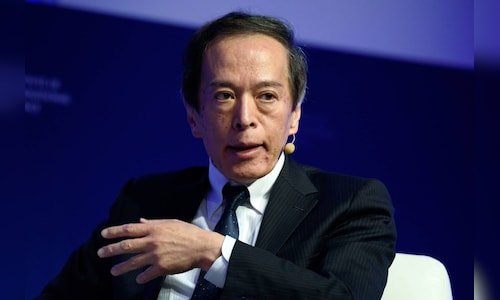In delivering the bank’s semi-annual report to lawmakers Wednesday, Ueda reiterated the BOJ’s stance that it will continue to raise interest rates if its economic outlook is realized, and refrained from making comments that gave any clear hints as to when the central bank might next hike rates. Ueda also pointed to the rising price trend, though he said it hasn’t reached the 2% target the bank is seeking.
“Our projection is that the underlying price trend will broadly reach 2% in the second half of our outlook period,” Ueda said. “Of course monetary policy can be adjusted in line with that outlook, but if the trend overshoots, we would adjust policy more strongly.”
Ueda speaks as investors seek hints over the likelihood of a rate hike at the two-day meeting ending May 1. The yen gyrated following his comments after weakening beyond a key threshold of 150 against the dollar earlier this week, on the back of lingering speculations that the rate differential with the US will remain wide.
Last week the BOJ kept its policy rate unchanged at its board meeting, keeping borrowing costs at 0.5%. While Japan’s overall inflation is running at the fastest pace among Group of Seven countries, its policy rate is the lowest among them.
Ahead of the latest policy board gathering, about three quarters of BOJ watchers expected another hike between June and September. Still, around half of them said that in the fastest scenario the bank could deliver another rate increase at the meeting ending May 1. Japan’s consumer prices rose 3% in February, a faster pace than expected, according to a government report Friday, in a sign of persistent inflationary pressure.
Prime Minister Shigeru Ishiba is planning to ease the impact of inflation on consumers through existing policy plans including cash handouts to low-income households and measures to slow the increase in the cost of rice, chief cabinet secretary Yoshimasa Hayashi said Tuesday.
While public discontent over inflation continues, Ishiba’s popularity has also sagged following his admission that he distributed shopping vouchers worth ¥100,000 ($672) to some newly elected ruling party lawmakers. That’s put him in a vulnerable position ahead of this summer’s general election.
Asked about the state of underlying inflation, Ueda outlined how the central bank is looking at the trend carefully, monitoring 10 to 15 indexes. Underlying inflation is getting closer toward 2% but isn’t quite there yet, he said.
“Underlying inflation is gradually accelerating,” said Ueda, adding that that’s why the BOJ has been raising rates. “Still, it’s not quite in the narrow range of around 2%, there’s a bit of distance.”
